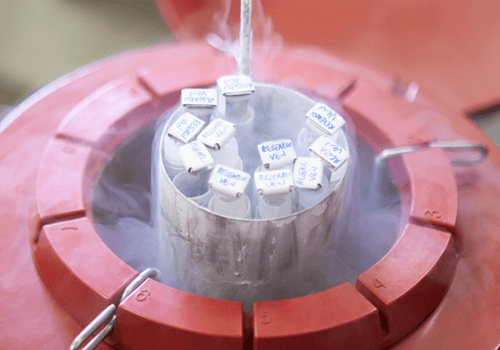FERTILITY PRESERVATION
Save your fertility for the future with our vitrification and cryopreservation services
At CACRM we offer fertility preservation services through vitrification and cryopreservation.
Vitrification involves freezing the embryo faster than conventional slow freezing. This ultrarapid process is so fast that it literally allows no time for intracellular ice that can damage the embryo. As a result, vitrification avoids trauma to the embryo. Vitrified embryos have a better than 90% freeze-thaw survival rate, and a pregnancy generating potential that is comparable to fresh embryos.
Vitrification is available at CACRM for both eggs and blastocysts. Blastocyst vitrification has been performed successfully for years. Cryopreservation or “freezing” involves storing vitrified eggs or embryos at a very low temperature in order to preserve them so they may be thawed and used at a later date.
As a result, there is much more information available on the long-term survival of blastocysts in comparison to oocytes (eggs). In addition to survival, fertilization must occur and advanced development of the embryo into a blastocyst must take place in order to achieve a pregnancy with vitrified oocytes.

Egg Freezing via Vitrification is mainly recommended for patients who are entering invasive cancer treatments that may inhibit the future production of oocytes (female eggs). It is also a mechanism used by women who are interested in freezing their eggs as an option of placing “the biological clock” on hold and to conceive at a later date.
Blastocyst Freezing preserves fertilized eggs (grown to Day 5 or 6 of embryonic development) for their future use. Often with IVF or ICSI, people have a number of unused embryos after their first cycle. Some people choose to freeze them for use in later treatment cycles. Your chances of becoming pregnant with a thawed frozen blastocyst is not affected by the length of time the embryo has been stored.
Sperm Freezing may be considered if, for example, you are facing medical treatment for a condition, that may affect your fertility, are about to have a vasectomy, have a low sperm count or the quality of your sperm is deteriorating, have difficulty producing a sample on the day of fertility treatment, or are at risk of injury or death (eg, you’re a member of the Armed Forces who is being deployed to a war zone). Sperm cells have been frozen, thawed and successfully used in treatment for more than 40 years, although not all sperm survive the freezing process. It is generally the same success as a fresh sperm sample.
